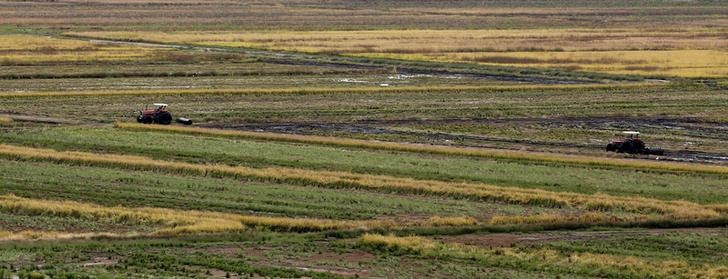PARIS (Reuters) - International tensions over trade could have a positive outcome for agriculture by reviving efforts to reform the most ineffective of policies that distribute hundreds of billions of dollars to farmers each year, the OECD said.
Nearly 70% of subsidies, taxes and other financial transfers involving farmers come from policies that heavily distort markets, notably by creating an artificial gap between domestic and world prices, the Paris-based Organization for Economic Co-operation and Development said in an annual survey of agriculture policy.
After significant steps in the early 2000s to reduce subsidies supporting production and prices, which the OECD sees as wasteful and preventing structural investments in farming, reform progress "has largely stalled" in the past decade, it said in the report published on Monday.
A rise in trade tensions has led to further market-disrupting measures such as tariffs, but could also focus attention on addressing longstanding distortions, Ken Ash, the OECD's director of trade and agriculture, told Reuters.
"We're choosing to be optimistic because there's a frustration with subsidies in a number of industrial sectors and in fisheries and agriculture," he said by telephone.
"If it turns from conflict to cooperation you could see measures that begin to discipline the most egregious actions that distort not just agriculture but other sectors as well."
Ash declined to comment on specific trade disputes, including a year-old tariff battle between the United States and China.
Agriculture is regularly a flashpoint in trade negotiations, notably in areas such as food standards and genetic modification, and has also been swept up in the U.S.-Chinese tussle.
Hopes of a resolution of the U.S.-Chinese trade war were revived on Saturday when U.S. President Donald Trump and Chinese counterpart Xi Jinping agreed to resume negotiations.
The OECD's survey of farm policy in 2016-18 covering 53 countries estimated that states offered $445 billion per year in net transfers to agricultural producers.
The share of gross farm revenue coming from policy measures was broadly stable over the period, it said.
For all countries, the average was around 12% of annual gross revenue. That included a gap between an average of just over 18% for members of the OECD group of rich nations, and around 9% for emerging countries.
But farmers in some countries, notably Argentina and India, lost more money than they gained from agricultural policies because of measures such as export taxes, the OECD said.
